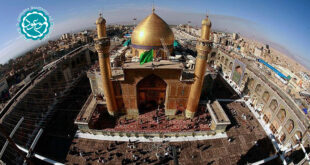The Main Argument
Now that we have elucidated these premises, we shall explain the kalām cosmological argument:
There is no doubt that at least one being exists in the whole world about which we can possibly talk or think. That is to say, the set of all existents is not a void set and we are not dealing with absolute nihility, on the contrary, this set indisputably has at least one element. This being is either a necessary being or a contingent being (while no other assumption is possible). In other words, this being is either inherently independent and is not dependent upon any other being for its existence (i.e. necessary being) or it is dependent upon another being for its existence (i.e. contingent being).
If the first assumption is correct, then the existence of a necessary being has been proven and as we have previously stated, this necessary being is God.
However, if the second assumption is correct and the presumed being is a contingent being, according to the causal principle it needs a cause, that is to say its existence indicates the existence of its cause. If its cause is a contingent being—which needs a separate cause—and this sequence of causes goes on unto infinity, we will have an infinite regress, while as we have previously shown an infinite causal regress is impossible. Another possibility is that the presumed contingent being, with or without intermediate causes, is the effect of a cause which itself has been caused by the presumed contingent being. This possibility is also invalid because it necessitates a circular cause and as we have indicated, a circular cause, like an infinite regress is intellectually impossible.
Therefore, the only remaining possibility is that this contingent being, with or without intermediate causes, has been brought about by a cause, which has not been precipitated by another object. The fact that this cause is not also an effect means that it is inherently independent and needless of others; this being is a necessary being. Thus, the existence of a necessary being has been proven once again.
According to what we have stated, the kalām cosmological argument can be thusly summarized: Undeniably, there is at least one being in the exterior world. If this being is a necessary being, our objective (which is the existence of God or a necessary being) has been proven. If it is a contingent being, considering its need of a cause and the impossibility of an infinite regress and a circular cause, it needs a being whose existence is not the effect of another being. This being is a necessary being (or God).
The Qur’an and the Need of Contingents towards God
As far as we know, the kalām cosmology argument has not been stated in the Holy Qur’an in its philosophic form. Several Qur’anic verses speak of a sort of need and dependency within all beings for God. These verses may be considered an indication of intellectual arguments that are founded upon the dependency of the world of contingents towards a God who is not dependent upon any being. For example, it has been stated in Sūrah Fāṭir:
“O people! You are the ones that have need of Allah; and Allah is the All-sufficient, the All-laudable.”42
Apparently, in this verse “neediness” has a very comprehensive meaning and includes a variety of needs that all beings have towards God, the most important of which is their existential dependency.
Also in various verses, the Qur’an emphasizes the fact that all beings, including humans, have been created and it has reasoned the existence of God—as the creator of the cosmos—in a manner that can be stated in the form of a logical argument. The Qur’an declares in argumentation against unbelievers:
“Have they been created from nothing or are they [their own] creators?”43
This is what may be extracted from this verse: Unquestionably, all humans have been created and initiated, meaning that they did not exist at one time and then they came into existence. Here we are confronted by several possibilities:
Humans have come into existence without a cause.
Humans are their own creators and originators.
These two possibilities, in all common sense, are obviously invalid and with little thought, their irrationality becomes evident. Therefore, the only logical possibility is that they are creations of a divine entity, transcendent to themselves who is God.
 Mouood Mouood English Edition
Mouood Mouood English Edition




